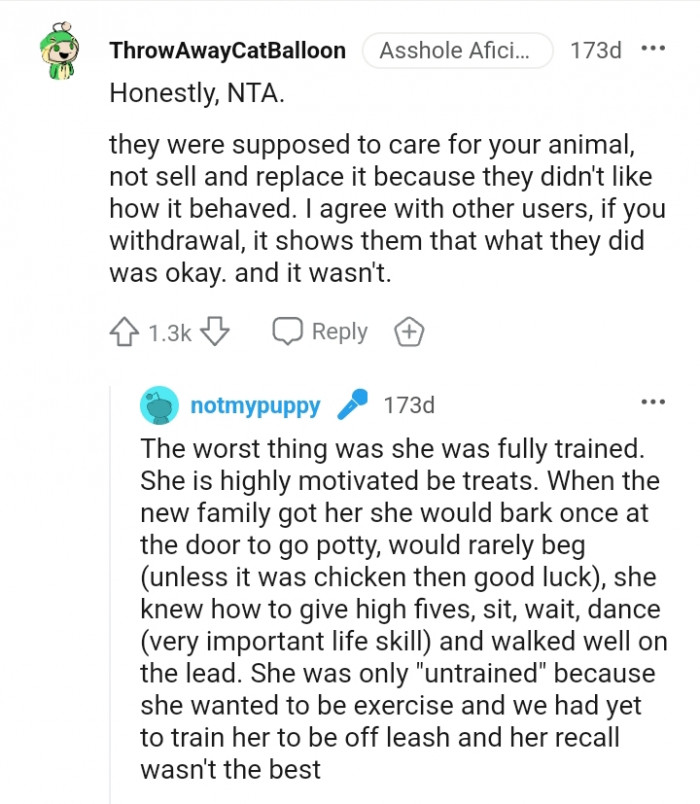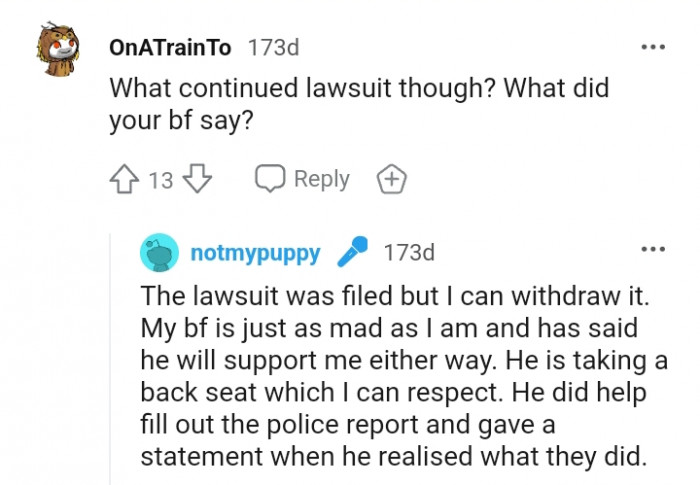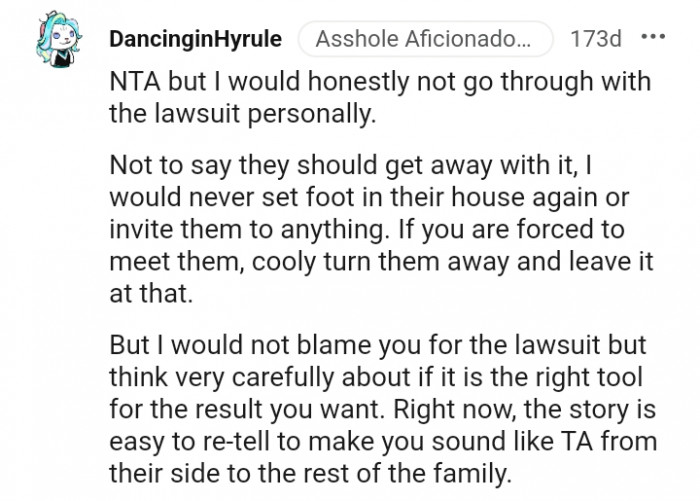Woman Sues Her In-Laws For Trading Her Dog While She Was Away
No one enjoys a lawsuit, especially when the situation could have been avoided. Trespassing, harassment, and other offenses can result in a citation from the authorities.
If that doesn’t work, you could be getting a seat in court. If that pans out against you, it could land you some fines or your freedom could be taken away. The Redditor in today’s story wants to continue with her lawsuit despite the situation being resolved.
One would ask what the issue is, and you’ll get to find out in a jiffy. Dogs are our most loyal companions, and pawrents don’t joke with them.
They are our source of joy and we love them to bits. What makes it all worth it is that these furry friends of ours love us just as much, if not more.
The OP has a spaniel puppy which she adores, and she left this puppy in the care of her boyfriend’s parents to go to the funeral of a family member. Mind you, the OP and her boyfriend have been living together for five years.
The OP returns only to find out that her boyfriend’s parents had traded her dog for a "better-trained one." This was where the OP threatened to sue if they didn't... Okay, okay, I’m revealing too much.
So go right ahead and read the entire story for yourself below.
OP says:

I've lived with my Bf for five years

We went to his parent's house for our dog

Understanding Attachment Styles
This incident involving a woman's lawsuit against her in-laws highlights the complexities of attachment styles within familial relationships. According to Bowlby’s attachment theory, the bonds we form during childhood can significantly influence our adult relationships and emotional responses. The reported actions of her in-laws may represent an avoidant attachment style, where individuals struggle to handle emotional connections, often resorting to disengagement or dismissive behaviors when faced with challenges.
Research indicates that avoidant individuals might perceive emotional situations, like caring for a pet, as burdensome and might opt for more ‘manageable’ alternatives, reflecting a desire to evade emotional responsibility. Understanding these dynamics can help the woman navigate her relationship with her in-laws and perhaps foster more productive communication strategies moving forward.
Understanding Attachment Styles
The emotional response of the woman in this case can be understood through the lens of attachment theory, which explains how early relationships with caregivers shape our expectations and behavior in later relationships. Research by Dr. Mary Ainsworth identified different attachment styles—secure, anxious, and avoidant—that dictate how individuals respond to perceived threats to their relationships.
In this scenario, the woman’s attachment style may influence her feelings of betrayal and abandonment when her in-laws made a unilateral decision regarding her pet. According to a study published in the Journal of Family Psychology, individuals with anxious attachment styles are particularly sensitive to relationship disruptions, leading to heightened emotional distress and conflict.
The act of trading the dog without the owner's consent raises significant ethical and psychological questions about ownership and attachment. According to research in the field of animal ethics, pets are often viewed as family members, and their well-being is closely tied to the emotional health of their owners. A study published in the Journal of Animal Ethics highlights that unauthorized changes in pet ownership can lead to profound feelings of loss and betrayal for the original owner.
This situation illustrates the need for clear communication and consent in familial relationships, particularly when it comes to caring for shared responsibilities.
The Emotional Bonds Between Owners and Pets
Dr. Linda Carter, a clinical psychologist at Oxford University, emphasizes that pets often serve as emotional anchors for their owners.
When a pet is adopted, the emotional investment can lead to strong feelings of loss and betrayal if the pet is rehomed.
Research indicates that these emotional bonds can complicate relationships, especially when others interfere in ownership.
She had a fantastic time with a loving family

The Reddit thread attracted hundreds of comments and the OP replied to most of the comments too. Here are some of the comments:
1. This redditor would never talk to them again

2. This should be a criminal charge

From a behavioral psychology perspective, the actions of the in-laws can be seen as a manifestation of learned behaviors and the perceived value of animals in familial settings. Dr. Alison Gopnik, a developmental psychologist, states, "People often project their own values onto pets, which can lead to significant misunderstandings in how they care for them." This aligns with the notion that individuals who view dogs primarily as companions tend to invest more emotionally and physically in their care, while those who see them as mere ‘pets’ may lack the same commitment. This discrepancy in perceived roles can foster resentment and conflict within family dynamics, as noted on her professional website alisongopnik.com.
Thus, understanding these differing perspectives can inform the woman’s approach in discussing the situation with her in-laws, emphasizing the emotional significance of her pet to her and how their actions undermined that bond.
The decision to sue her in-laws for trading her dog reflects broader themes of autonomy and control in interpersonal relationships. Research in social psychology indicates that perceived loss of control can lead to feelings of helplessness and frustration, as detailed in a study by Dr. Julie Norem at Wellesley College. She found that individuals often experience a psychological backlash when their autonomy is threatened, leading to emotionally charged reactions.
This reaction can be compounded by cultural norms surrounding the treatment of pets, viewed as family members by many. When someone feels that a personal boundary has been violated—such as in the case of her dog being given away—it's common for them to seek retribution or justice through legal channels.
Understanding Attachment to Pets
Pets often serve as important emotional anchors for their owners, creating strong attachment bonds that can be comparable to those found in human relationships. Research from the University of California, Berkeley indicates that these bonds can influence an owner’s identity and emotional stability. When a pet is removed from this relationship without consent, it can evoke similar feelings of grief and abandonment that occur when losing a human loved one.
Understanding this attachment is crucial for recognizing the emotional stakes involved in pet ownership disputes.
Pet ownership often mirrors human attachment styles, with owners developing deep emotional connections to their animals.
Studies show that conflicts regarding pets can evoke strong emotional responses, often rooted in feelings of abandonment or inadequacy.
This can manifest in legal disputes, as seen in cases where owners feel their emotional investments have been undermined.
3. You can sue because they stole from you

4. They sold your dog illegally to another family

5. We rehomed her with a good family

The Role of Empathy in Conflict Resolution
Empathy plays a crucial role in resolving conflicts and fostering understanding in strained relationships. According to Dr. Alexandra Solomon, a relationship therapist, "Empathy allows us to step into another person's shoes, which can transform conflict into connection." When individuals practice empathy, they can better navigate interpersonal disputes by acknowledging others’ feelings and perspectives. Dr. Solomon emphasizes that "understanding the motivations behind someone's actions can lead to more constructive dialogues." For the woman involved in this case, approaching her in-laws from a place of empathy—attempting to understand their motivations—might facilitate a more constructive dialogue. This could involve expressing her feelings about the loss of her pet while also inviting her in-laws to share their challenges with pet care, creating a platform for mutual understanding rather than blame.
The Role of Communication in Family Dynamics
Effective communication is crucial in managing family relationships, and this case underscores the importance of open dialogue regarding boundaries and expectations. Research by Dr. John Gottman, a leading expert in marital and family relationships, indicates that poor communication can lead to misunderstandings and conflict, often resulting in a breakdown of trust.
In this situation, it seems there was a significant lack of communication between the woman and her in-laws. According to Gottman's principles, fostering a culture of open communication can help prevent conflicts like this from escalating. Families are encouraged to engage in regular discussions about their feelings and expectations concerning shared responsibilities, which can alleviate tension and promote understanding.
The act of trading the dog may also reflect deeper relational dynamics within the family. According to attachment theory, individuals with anxious or avoidant attachment styles may struggle with communication and conflict resolution. A study by the University of Michigan suggests that these attachment styles can lead to misunderstandings and actions that exacerbate existing tensions, highlighting the importance of addressing underlying emotional issues in familial relationships.
This context can shed light on the in-laws’ actions and the potential lack of understanding regarding the emotional implications of their decision.
Navigating Ownership Disputes
To effectively navigate ownership disputes, it’s crucial for pet owners to document their emotional connections and routines with their pets.
Seeking mediation can provide a neutral ground for discussing ownership issues, helping to avoid legal battles that can be damaging to all parties involved.
Counseling can also help individuals process their feelings and foster healthier communication about pet ownership.
6. We filed a police report and flagged her ID number

7. I was devastated that she was gone

8. This is to set precedent for other people

The act of trading the dog can evoke complex emotional responses, particularly feelings of betrayal and loss. According to Dr. Laura Berman, a renowned sex therapist, "The loss of a pet can create a deep sense of grief, as pets are often considered family members." This sentiment is echoed by Dr. Susan David, an emotional agility expert, who states, "Grief is a natural response to loss, and it’s crucial to honor these feelings to heal." Recognizing these emotions as valid can help the woman cope with her emotional response. A recommended practical solution is to engage in grief counseling or support groups focused on pet loss, which can provide her with the space to process her emotions and connect with others who understand her experience.
Legal disputes often arise from deeper emotional issues, and the woman's decision to pursue a lawsuit may be a manifestation of unresolved feelings of betrayal and loss. As noted by Dr. William Doherty, family therapist, "When individuals feel wronged, they may turn to legal avenues as a way to seek validation for their emotional pain." This highlights the importance of addressing emotional grievances directly rather than resorting to litigation, which can often exacerbate feelings of hostility. Therapeutic approaches such as mediation or family therapy can provide a platform for expressing feelings in a constructive manner, promoting healing and resolution without the adversarial nature of a lawsuit, as emphasized by Dr. Tina Payne Bryson, child development expert, who states, "Open communication and understanding are key to resolving conflicts and fostering healthy relationships."
The Importance of Communication in Family Dynamics
Effective communication is critical in navigating conflicts related to pet ownership. Research from the Journal of Family Psychology emphasizes that open dialogues can help family members express their feelings and needs, creating a sense of unity and understanding. In this case, discussing the significance of the pet to the owner can help others appreciate the emotional weight of their actions and the implications of rehoming the dog.
Fostering an environment where feelings can be openly shared is essential for healthy family dynamics.
Understanding the emotional stakes in pet ownership disputes can facilitate more constructive conversations.
A psychologist specializing in family dynamics suggests that creating a dialogue based on empathy can lead to resolutions that honor everyone's feelings.
Recognizing that pets are often seen as family members can shift the focus from ownership to well-being.
9. The dog was very well trained

10. If you withdraw, then what they did was okay

11. Puca was near death when we got her

Navigating Family Dynamics
Family systems theory suggests that each member of a family influences and is influenced by others, creating a complex web of interactions and expectations. According to Dr. Murray Bowen's family systems theory, unresolved issues within family dynamics can lead to significant stress and conflict, particularly when one member feels undermined or disrespected.
In this case, the woman’s feelings of betrayal could be symptomatic of deeper family issues, such as a lack of communication or unexpressed grievances. Addressing these issues through family therapy might provide a safe space for all parties to express their concerns and work towards healthier interaction patterns, ultimately enhancing familial relationships.
The Impact of Pet Ownership on Mental Health
Pets hold a special place in many people's lives, providing companionship and emotional support. Research indicates that pet ownership can significantly improve mental health by reducing feelings of loneliness and anxiety. A study conducted by the University of Missouri found that pet owners often report lower levels of stress and higher levels of emotional well-being.
In the context of this case, the woman's attachment to her dog may represent a crucial source of emotional support. When her in-laws traded her dog, it could have triggered feelings of abandonment and loss, akin to losing a close family member. Understanding the psychological impact of pet ownership can shed light on her strong emotional response and the motivations behind her legal actions.
Additionally, developing a family agreement about pet care and responsibilities can prevent future misunderstandings. A clinical psychologist emphasizes that setting clear expectations can help align family members on shared responsibilities, reducing conflicts over pet ownership. Research shows that families who actively engage in collaborative decision-making are more likely to experience positive outcomes and strengthen their bonds.
Creating such agreements can ensure that everyone feels valued and involved, fostering a sense of teamwork within the family.
12. This redditor has some sympathy for the family

13. Both babies are doing well and will be having a play date

14. She wasn't able to be let off leash

Research into conflict resolution emphasizes the importance of open communication and setting clear boundaries within family relationships. A study published in the Journal of Family Psychology found that families who implement assertive communication strategies experience lower levels of conflict and greater satisfaction in relationships.
The woman could consider having a candid conversation with her in-laws about her expectations regarding pet care and boundaries concerning her property. Framing this dialogue around mutual respect and understanding may create a foundation for more respectful interactions in the future.
Emotional regulation plays a significant role in how individuals respond to distressing situations. The woman’s feelings of anger and betrayal may indicate difficulties in managing her emotions effectively. Research in emotional intelligence suggests that individuals who can recognize and regulate their emotions are better equipped to handle conflict without resorting to extreme measures.
Practicing emotional regulation techniques, such as mindfulness and cognitive reframing, can help individuals navigate complex emotional landscapes. By learning to identify their emotional triggers and respond in a more adaptive manner, individuals can prevent emotional outbursts and foster healthier relationships with family members.
The Emotional Fallout of Unauthorized Pet Trading
Ultimately, the emotional consequences of trading a pet without consent can lead to long-lasting rifts in familial relationships. A study from the University of Toronto indicates that unresolved conflicts can result in feelings of resentment and alienation among family members. This highlights the need for addressing disputes promptly, ensuring that all voices are heard and respected.
By creating a more supportive and communicative family environment, families can prevent these conflicts from escalating and impacting their overall well-being.
15. He is taking a back seat

16. This redditor is breaking things down for the OP

17. They most certainly cannot be trusted

The Impact of Stress on Decision-Making
Stress often impacts our decision-making abilities, leading to choices that might not align with our values. Research from the Harvard School of Public Health reveals that high levels of stress can impair cognitive function and lead to impulsive actions, which could explain why the in-laws made a quick decision to trade the dog without fully considering the emotional ramifications.
For the woman, understanding that stress might have influenced her in-laws' decision can help her approach the situation with compassion. Recognizing these underlying pressures may also provide her with insights on how to address future conflicts without escalating tensions further.
Cultural Perspectives on Family and Responsibility
This case also illustrates cultural variations in how family responsibilities are perceived. In collectivist cultures, the emphasis on familial loyalty and duty can create significant stress for individuals when family members act contrary to their expectations. Research by Dr. Harry Triandis highlights that in such cultures, individuals often feel a profound sense of obligation to family, which can lead to intense emotional reactions when those expectations are violated.
Understanding these cultural dimensions can provide insight into the woman's strong response to her in-laws' actions. By encouraging discussions about cultural expectations and responsibilities, families can work towards a more harmonious coexistence, reducing the likelihood of disputes over perceived disloyalty or neglect.
18. They gave your property away to someone else

19. Turn them away and leave it at that

20. This Redditor is of the opinion that a lawsuit won't do anything

In navigating this challenging situation, the woman may benefit from implementing mindfulness techniques to manage her emotional responses and stress levels. Research has shown that mindfulness practices can enhance emotional regulation and reduce anxiety, allowing individuals to respond to conflict more thoughtfully rather than reactively.
Techniques such as deep breathing, meditation, or journaling can empower her to process her emotions and approach her in-laws with a clearer mindset. Engaging in these practices might foster a more constructive dialogue, ultimately leading to a resolution that respects her emotional needs while considering her in-laws' perspectives.
Finally, conflict resolution strategies are essential for navigating disputes like the one presented here. Effective conflict resolution requires both parties to engage in active listening and empathy, which are skills that can be developed over time. Research indicates that couples and families who practice these skills are more likely to reach satisfactory resolutions without escalating tensions.
One approach is to encourage family members to express their feelings without assigning blame. This can create an environment where all parties feel heard and validated, paving the way for collaborative problem-solving. Engaging a neutral third party, such as a mediator or therapist, can also foster healthy communication and resolution.
Dogs are one animal that sticks by us through thick and thin, making sure that they always keep us vibrant and happy. So you can’t totally blame the OP for her actions or her wanting to continue the lawsuit.
If you have a different opinion, do share it with us by leaving your reply in the comments section below.
Psychological Analysis
This situation underscores the psychological complexities surrounding pet ownership and the emotional attachments involved.
Addressing these issues with empathy and understanding can lead to healthier outcomes for both the pets and their owners.
Analysis generated by AI
Analysis & Alternative Approaches
When faced with ownership disputes, recognizing the emotional significance of pets is paramount.
Research suggests that mediation and open dialogue can lead to healthier outcomes for all parties involved.
Ultimately, prioritizing the emotional well-being of the pet and the individuals involved can pave the way for more compassionate resolutions.
Analysis & Alternative Approaches
In conclusion, the unauthorized trading of a pet underscores the complexities of emotional attachments and family dynamics. Recognizing the psychological impact of such decisions can help families navigate conflicts with greater empathy and understanding. Fostering open communication and collaborative decision-making can lead to healthier family relationships and a more harmonious living environment.
Clinical Perspective & Next Steps
In conclusion, this case highlights the intricate interplay between emotional responses, family dynamics, and cultural values. Psychologists emphasize that understanding the underlying psychological principles can provide valuable insights into conflict resolution and emotional healing. As noted by Dr. Daniel Kahneman, a Nobel laureate in economics, "The ability to manage emotions and communicate effectively is crucial in resolving conflicts." Research consistently supports the idea that open communication and emotional regulation are essential strategies for improving family relationships, as highlighted by Dr. Dan Ariely, a behavioral economist, who states, "Understanding the psychology behind our interactions can prevent misunderstandings and legal disputes." By actively working to develop these skills, families can foster healthier interactions and prevent the escalation of conflicts into legal disputes.
Moving Forward: Actionable Steps
Overall, the incident surrounding the woman's lawsuit reveals the intricate dynamics of family relationships and the emotional complexities involved in pet ownership. Understanding these dynamics through the lens of psychological research can provide valuable insights into how to address conflict effectively and compassionately. By fostering open communication, practicing empathy, and implementing emotional regulation techniques, individuals can work towards healthier familial interactions and navigate challenging situations with increased resilience and understanding.
Ultimately, healing in familial relationships often stems from recognizing shared values and respecting individual perspectives, leading to more harmonious connections in the long run.



